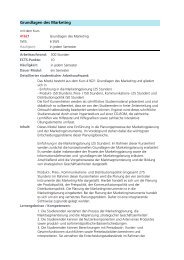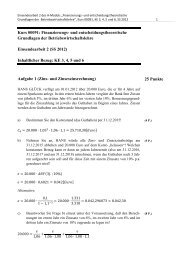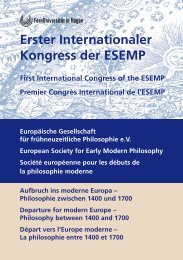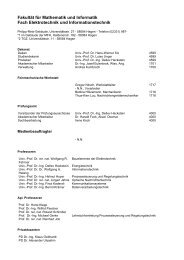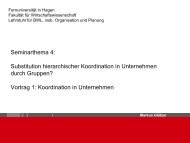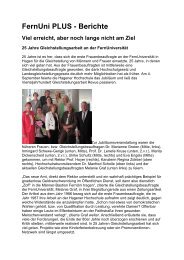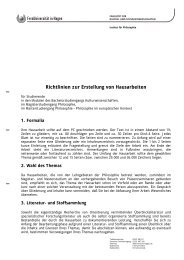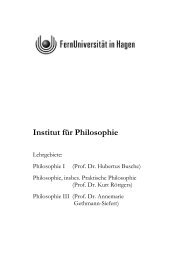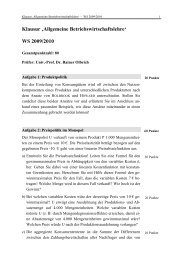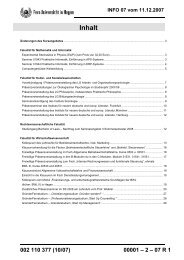An Invitation to Random Schr¨odinger operators - FernUniversität in ...
An Invitation to Random Schr¨odinger operators - FernUniversität in ...
An Invitation to Random Schr¨odinger operators - FernUniversität in ...
You also want an ePaper? Increase the reach of your titles
YUMPU automatically turns print PDFs into web optimized ePapers that Google loves.
5<br />
1. Preface<br />
In these lecture notes I try <strong>to</strong> give an <strong>in</strong>troduction <strong>to</strong> (some part of) the basic theory<br />
of random Schröd<strong>in</strong>ger opera<strong>to</strong>rs. I <strong>in</strong>tend <strong>to</strong> present the field <strong>in</strong> a rather self<br />
conta<strong>in</strong>ed and elementary way. It is my hope that the text will serve as an <strong>in</strong>troduction<br />
<strong>to</strong> random Schröd<strong>in</strong>ger opera<strong>to</strong>rs for students, graduate students and researchers<br />
who have not studied this <strong>to</strong>pic before. If some scholars who are already<br />
acqua<strong>in</strong>ted with random Schröd<strong>in</strong>ger opera<strong>to</strong>rs might f<strong>in</strong>d the text useful as well I<br />
will be even more satisfied.<br />
Only a basic knowledge <strong>in</strong> Hilbert space theory and some basics from probability<br />
theory are required <strong>to</strong> understand the text (see the Notes below). I have restricted<br />
the considerations <strong>in</strong> this text almost exclusively <strong>to</strong> the <strong>An</strong>derson model, i.e. <strong>to</strong> random<br />
opera<strong>to</strong>rs on the Hilbert space l 2 (Z d ). By do<strong>in</strong>g so I tried <strong>to</strong> avoid many of<br />
the technical difficulties that are necessary <strong>to</strong> deal with <strong>in</strong> the cont<strong>in</strong>uous case (i.e.<br />
on L 2 (R d )). Through such technical problems sometimes the ma<strong>in</strong> ideas become<br />
obscured and less transparent.<br />
The theory I present is still not exactly easy staff. Follow<strong>in</strong>g E<strong>in</strong>ste<strong>in</strong>’s advice, I<br />
tried <strong>to</strong> make th<strong>in</strong>gs as easy as possible, but not easier.<br />
The author has <strong>to</strong> thank many persons. The number of colleagues and friends I<br />
have learned from about mathematical physics and especially disordered systems<br />
is so large that it is impossible <strong>to</strong> mention a few without do<strong>in</strong>g <strong>in</strong>justice <strong>to</strong> many<br />
others. A lot of the names can be found as authors <strong>in</strong> the list of references. Without<br />
these persons the writ<strong>in</strong>g of this review would have been impossible.<br />
A colleague and friend I have <strong>to</strong> mention though is Frédéric Klopp who organized<br />
a summer school on <strong>Random</strong> Schröd<strong>in</strong>ger opera<strong>to</strong>rs <strong>in</strong> Paris <strong>in</strong> 2002. My lectures<br />
there were the start<strong>in</strong>g po<strong>in</strong>t for this review. I have <strong>to</strong> thank Frédéric especially<br />
for his enormous patience when I did not obey the third, forth, . . . , deadl<strong>in</strong>e for<br />
deliver<strong>in</strong>g the manuscript.<br />
It is a great pleasure <strong>to</strong> thank Bernd Metzger for his advice, for many helpful discussions,<br />
for proofread<strong>in</strong>g the manuscript, for help<strong>in</strong>g me with the text and especially<br />
with the references and for many other th<strong>in</strong>gs.<br />
Last, not least I would like <strong>to</strong> thank Jessica Langner, Riccardo Catalano and Hendrik<br />
Meier for the skillful typ<strong>in</strong>g of the manuscript, for proofread<strong>in</strong>g and for their<br />
patience with the author.<br />
Notes and Remarks<br />
For the spectral theory needed <strong>in</strong> this work we recommend [117] or [141]. We will<br />
also need the m<strong>in</strong>-max theorem (see [115]).<br />
The probabilistic background we need can be found e.g. <strong>in</strong> [95] and [96].<br />
For further read<strong>in</strong>g on random Schröd<strong>in</strong>ger opera<strong>to</strong>rs we recommend [78] for the<br />
state of the art <strong>in</strong> multiscale analysis. We also recommend the textbook [128]. A<br />
modern survey on the density of states is [67].



